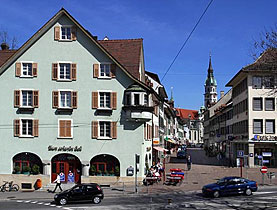Temperatures rise as rich face tax vote

The impending nationwide vote on forcing cantons to set minimum income tax rates for high earners has descended into a war of threats and stinging rebukes.
The centre-left Social Democratic Party launched its “fair tax” initiative to help level the playing field for all income earners. But the government and business leaders fear a yes vote on November 28 will damage the Swiss economy.
A recent poll by the gfs.bern institute predicting that 58 per cent of voters will support the initiative has clearly rattled the business community.
They stepped up a massive campaign with posters, newspaper advertisements and cinema spots over the past few weeks.
Some prominent industrial names have now threatened to leave Switzerland along with their companies if the poll proves to be accurate.
“I would move abroad,” Alfred Schindler, head of the Schindler elevator company, told the Swiss press at the weekend. “Switzerland means a lot to me, but my own tax burden would rise to 70 per cent. That is disproportionate and unbearable.”
His words were echoed by Bernhard Alpstaeg of energy concern Swisspor and Peter Spuhler of railway construction firm Stadler rail.
But such threats are unlikely to rattle the initiative’s opponents, with Social Democratic parliamentarian Jacqueline Fehr earlier labeling them as an “unacceptable” example of “national extortion” by the rich.
Minimum rates
Income tax in Switzerland is levied at federal, cantonal and communal levels with cantons largely free to set their own rates. Cantons compete to set low rates in a bid to attract the top foreign workforce talent.
This practice has been widely criticised by the Social Democrats for some time for favouring the top one per cent of highest earners. The financial crisis followed by a global recession has pushed the issue higher up the public agenda.
The Social Democrats, supported by the Green Party, has called for all 26 cantons to impose a minimum income tax rate of 22 per cent for people earning more than SFr250,000 ($255,000) and a 0.5 per cent wealth tax levy on assets above SFr2 million.
The Social Democrats said the changes would bring benefits to the remaining 99 per cent of people by directly affecting just one per cent of the richest workers. “This small section of people would no longer be able to withdraw from their social obligations and flee to tax havens such as Zurich and Zug,” the party stated.
Justice?
The Conference of Cantonal Governments criticised the proposals as an attack on the long established tradition of cantonal sovereignty. But Jacqueline Fehr believes that cantons would be freed from the current race to set lower rates than their neighbours to attract more revenues.
“This initiative strengthens the autonomy of cantons,” she argued. “The cantonal governments would no longer be held hostage by the excessive tax competition that forces them to set lower taxes for the rich against their will.”
The Swiss government also rejected the aims of the initiative, with former Finance Minister Hans-Rudolf Merz delivering a damning verdict before he left office at the end of October.
“This initiative promises more justice, but in truth it cannot deliver what it promises,” he said. “One cannot speak of justice when one per cent of the population, that already contributes 35 per cent of tax revenue, would be asked for more money.”
Tax consultancy company KPMG fears a revision of the tax code could put highly skilled foreign workers and top companies off from relocating to Switzerland.
Domino effect
The timing could not have come at a worse time, according to KPMG managing partner Jörg Walker. The European Union is currently pressuring Switzerland to outlaw so-called post box firms – companies that set up an unstaffed offices in Switzerland in order to sidestep taxes.
Switzerland may soon have to end this practice, meaning that such foreign companies would have to start filling these addresses with employees.
“What we will see more and more is that companies that set up support offices in Switzerland will also have to send over their decision makers [managers],” Walker told swissinfo.ch. He fears that some post box firms would simply disappear to another location if income tax rates become unattractive.
Walker added that the current average income tax rate of 34 per cent is attractive, but is not the lowest in Europe.
“Raising income taxes would send out the wrong message to the international community,” he said. “People would become nervous that it could set off a domino effect, with individual lump sum taxation the next in line to go.”
The fair tax initiative does appear to have some momentum behind it in Switzerland. At the start of this year canton Zurich ended its practice of negotiating preferential lump sum tax deals for wealthy foreigners following a public vote.
While lump sum taxes are not connected to the November 28 vote, several other cantons may hold similar votes to Zurich next year, demonstrating a public willingness to crack down on “fat cats” during times of hardship.
Switzerland levies income tax at three levels: federal, cantonal and local communal. The top federal rate is 11.5% for people earning SFr712,500 per year or more (by far the highest threshold in Europe).
Cantons and communes are free to set their own income tax rates within the parameters of the 2001 tax harmonization act.
Switzerland is not the only country that employs low taxes as a carrot to attract wealthy people and highly skilled, and highly paid, workers.
A KPMG comparison of income tax rates around the world found that the highest rates shrank from 31.4% to 29.4% between 2003 and 2010 among developed economies.
The average upper income tax levy in Switzerland is 34%, but the rate varies from canton to canton.
High earners in Zug can expect to shell out 22.9% in combined federal, cantonal and communal rates. The next lowest rates are in cantons Schwyz (23.9%), Obwalden (24.1%), Appenzell Inner Rhodes (24.8%) and Uri (25.8%).
The most expensive rates for high earners are in Geneva (44.5%), Jura (43.1%), Basel Country (42.5%), Vaud (41.5%) and Bern (41.2%).
The best European venues are Bulgaria (10%), Russia (13%) and a variety of eastern European countries.
Sweden charges the highest rate of income tax for high earners (56%) followed by Denmark (55.4%) and the Netherlands (52%).

In compliance with the JTI standards
More: SWI swissinfo.ch certified by the Journalism Trust Initiative











You can find an overview of ongoing debates with our journalists here . Please join us!
If you want to start a conversation about a topic raised in this article or want to report factual errors, email us at english@swissinfo.ch.